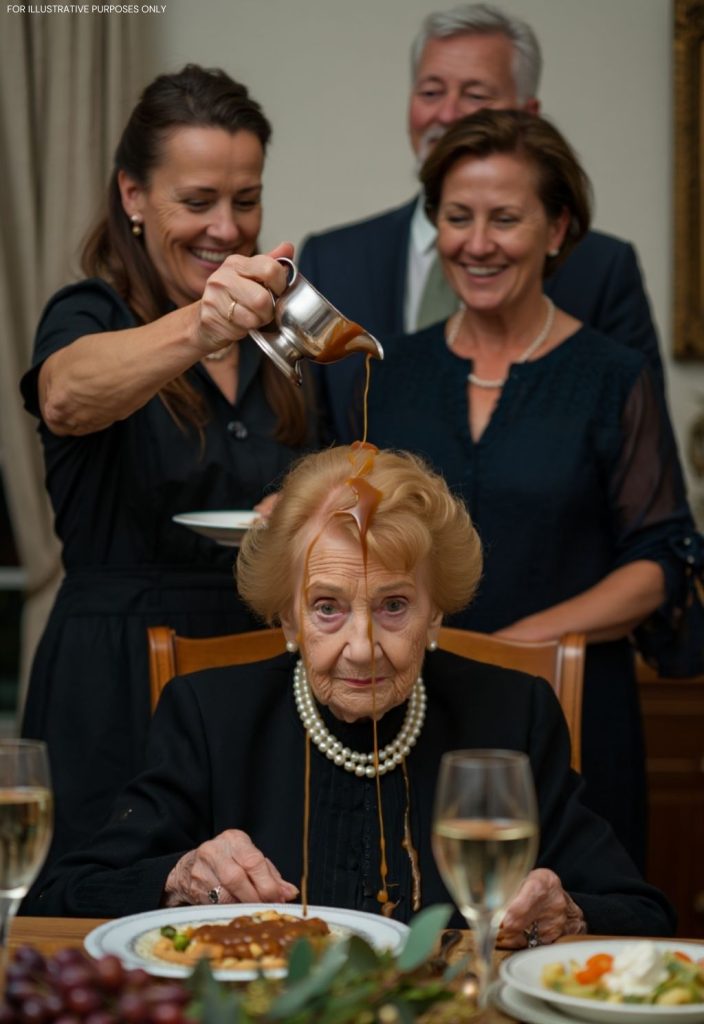I had spent three days preparing for that Thursday. My arthritic hands kneaded dough for bread rolls until they ached. I polished the porcelain my mother had left me and baked chestnut stuffing that my son, Lucas, had loved since childhood. At sixty-nine, I insisted on doing everything myself, holding tight to the traditions that connected me to the family I had nurtured.

Lucas had married Camille six years prior. From the start, I had tried to embrace her as a daughter. She was beautiful, elegant, and charming whenever there was an audience. She had given me two grandchildren, for whom I was endlessly grateful. But behind that polished exterior was always a chill, a calculation that made me feel like an outsider in my own son’s life.
That morning, I arrived at their stone-front home outside Manchester at ten sharp, carrying my casserole and pumpkin tart. Camille answered the door in a cream silk dress, more suited to an opera than a family meal.
“Clara, you’re early,” she said, though I was perfectly on time. Her smile never touched her eyes.
“I thought I could help,” I said, stepping in.
“The kitchen’s ready, but you know your way,” she replied, her sweetness thin and dismissive.
The aroma of roasting filled the air. On the counter, I noticed another dish — her version of the same recipe.
“Oh, I didn’t realize you were making one too,” I murmured.
“Variety is always good,” she said with a faint shrug.
It was a small, deliberate jab. Camille specialized in subtle cuts that left me feeling outdated, unnecessary. Mention it to Lucas, and he would sigh, telling me I was too sensitive.
By noon, the house buzzed with relatives and friends. Camille’s parents treated me with polite distance. Lucas’s friends chatted and laughed, while I hovered on the edge. Whenever I tried to help, Camille gently pushed me aside, her concern more like exclusion.
I ended up in the sitting room, watching my grandson Oliver play with cars. He used to run to me, arms open, but now Camille quickly redirected him, keeping him close.
At the table, I was seated at the far end, where conversations skimmed past me: ski trips to Austria, London theater, inside jokes I couldn’t follow. I chewed green beans and forced a smile.
Then the moment arrived. Camille picked up the silver gravy boat and moved behind me. For a split second, I hoped she might include me in the conversation. Instead, she tilted it.
Hot gravy poured over my hair, face, and best blue dress. The room froze — then Lucas laughed, loud and booming, and everyone followed. Even Oliver giggled, copying the adults.
“Oh, Clara, I’m so clumsy! Please forgive me!” Camille cried, dabbing my dress with napkins, eyes sparkling with quiet triumph. “I’ll find you something upstairs — perhaps more suitable.”
I excused myself to the bathroom, each step dripping humiliation across their polished floors. In the mirror, I saw a woman defeated, her hair matted with gravy. But as I cleaned myself, the shame gave way to resolve. Camille had no idea I had been preparing for this day months ago, ever since overhearing her whisper to her sister that she would be relieved when I finally passed away.
That evening, I began executing my plan: contacting lawyers, scheduling appointments, arranging everything meticulously.
During dessert, the doorbell rang. Camille frowned. “Who could that be?”
Lucas returned, looking puzzled. “A notary. She says she has an appointment with Mom.”
Camille paled. “Today of all days?”
“She’s here for me,” I said calmly. “I have documents that require attention.”
In Lucas’s study, beneath the family portraits Camille had staged, I signed over ninety percent of my estate into an irrevocable charitable trust. It would fund children’s hospitals, food banks, and scholarships. The remainder would keep me comfortable. Camille would inherit nothing.
She had to witness it herself, her pen trembling as she signed beside Lucas. For a moment, her carefully maintained mask faltered, revealing panic.
When the notary left, the celebration collapsed into awkward silence. I sipped water and said lightly, “Now, where were we?” But the feast was over.
Later, driving home along quiet streets, I felt lighter than I had in years. The battle Camille thought she had won with gravy was already lost. My legacy was secure, my dignity restored. She had tried to make me invisible in my own family. Instead, I had ensured her greed would haunt her forever.
If you like, I can also rewrite this as a shorter, punchy version ideal for social media or a suspenseful story that emphasizes Clara’s quiet revenge. Do you want me to do that?